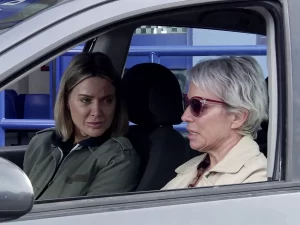Coronation Street is set to take a deeply emotional turn as Debbie Webster’s life is rocked by a heartbreaking dementia diagnosis, shifting her storyline into powerful new territory. Long known for her fiery independence and business savvy, Debbie’s sharp mind and tough exterior are suddenly at odds with the gradual decline she now faces. In a dramatic shift that will affect not just her, but the entire community, this storyline explores themes of vulnerability, identity, and the strength of human connection when everything else begins to fade.
It all begins subtly. Debbie starts misplacing keys, forgetting appointments, and calling people by the wrong names. At first, she brushes it off as stress or simple forgetfulness—after all, who hasn’t had a scatterbrained day or two? But soon, loved ones begin to notice a worrying pattern. Kevin, her brother, is the first to confront her, asking if she’s okay after she forgets to lock up the garage overnight—something she never would have overlooked in the past.
Debbie laughs it off at first, defensive and unwilling to admit something might be wrong. But a visit to Dr. Gaddas confirms what she has feared deep down: she’s in the early stages of dementia. The diagnosis is a gut-punch—not just to Debbie, but to those closest to her. For someone who has always prided herself on staying in control, the idea of slowly losing her mind feels like the ultimate betrayal.
The next few episodes explore Debbie’s struggle to accept her condition. At times, she’s angry and lashes out at those trying to help. At other moments, she’s quietly terrified. The show handles these emotional swings with care, giving viewers an honest and empathetic portrayal of what early-onset dementia can look like. The scenes are heartbreaking but grounded in reality, offering not only drama but also education and awareness.
Kevin tries his best to support his sister, but their long-standing differences make it difficult. He doesn’t know how to talk about feelings, and Debbie doesn’t want pity. Their arguments are raw, but they also open the door to long-needed healing. In one particularly touching scene, Kevin finds a photo of them as kids and shares a memory Debbie had forgotten. The grief in her eyes is visible, but so is the love that’s still there.
Other characters become involved as well. Leanne, having gone through her own traumas, forms an unlikely bond with Debbie, helping her navigate new coping strategies. Roy offers books and tea, a gentle presence in her increasingly chaotic world. Even Carla, who once clashed with Debbie over business, steps in to offer real empathy—having dealt with her own mental health struggles.
As the community begins to rally around Debbie, she starts to let her guard down. She accepts help managing her schedule, agrees to therapy, and begins writing down memories in a journal while she still can. One particularly poignant moment comes when she records a message for herself to watch in the future—a tearful reminder of who she is when the fog of illness grows heavier.
The show doesn’t shy away from the difficult realities either. In one episode, Debbie becomes disoriented and wanders out of the Bistro during a busy night, only to be found hours later by a worried Tyrone. It’s a frightening moment, both for her and the viewers, as it shows how quickly things can spiral. Afterwards, she begins considering long-term care options—not because she’s giving up, but because she wants to maintain dignity and agency while she still can.
Meanwhile, the diagnosis has ripple effects. Debbie reconnects with estranged family members, including a cousin she hasn’t spoken to in years. A surprise visit brings old wounds to the surface—but also leads to forgiveness. Through her illness, relationships once fractured begin to heal, and it becomes clear that this journey, while painful, is also a chance for renewal.
The writers have been praised for their sensitive and nuanced approach to this storyline. Rather than making Debbie a passive victim of her illness, they show her as a fighter—one who’s scared, flawed, but still full of strength. Her vulnerability makes her more human than ever, and actress Sue Devaney delivers a powerful, layered performance that is already earning critical acclaim.
Looking ahead, spoilers hint at further emotional developments. A potential romance may emerge with someone from Debbie’s past, raising questions about love, memory, and what it means to start over when time feels uncertain. There’s also speculation that she may take a bold step and sell her business, choosing to focus on her quality of life rather than ambition.
Through it all, Debbie’s character arc serves as a tribute to those battling dementia in real life—their courage, their grief, and the moments of joy they still cling to. Her story reminds us that even in the face of decline, there is dignity, connection, and meaning.
As Coronation Street continues to explore this challenging yet beautiful story, fans can expect moments of sorrow, but also resilience and hope. Debbie may be losing parts of herself, but in many ways, she’s also discovering who she truly is—and reminding us all of what matters most: love, memory, and the people who walk beside us, even when we start to forget.
